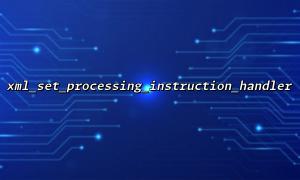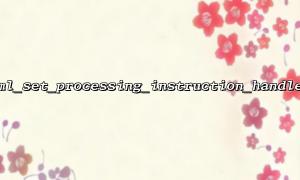xml_set_processing_instruction_handler is a PHP function used to set the callback handler for processing instructions in an XML document. When the parser encounters a PI, the specified callback is invoked. The syntax is as follows:
<span><span><span class="hljs-keyword">bool</span></span><span> </span><span><span class="hljs-title function_ invoke__">xml_set_processing_instruction_handler</span></span><span> (resource </span><span><span class="hljs-variable">$parser</span></span><span>, </span><span><span class="hljs-keyword">callable</span></span><span> </span><span><span class="hljs-variable">$handler</span></span><span>)
</span></span>$parser is the parser resource created by xml_parser_create.
$handler is the user-defined callback function that will be invoked when a processing instruction is encountered.
For example, suppose the XML file contains the following processing instruction:
<span><span><span class="hljs-meta"><?php my_processing_instruction data ?></span></span><span>
</span></span>You can set a callback to handle this scenario like so:
<span><span><span class="hljs-function"><span class="hljs-keyword">function</span></span></span><span> </span><span><span class="hljs-title">handle_pi</span></span><span>(</span><span><span class="hljs-params"><span class="hljs-variable">$parser</span></span></span><span>, </span><span><span class="hljs-variable">$target</span></span><span>, </span><span><span class="hljs-variable">$data</span></span><span>) {
</span><span><span class="hljs-keyword">echo</span></span><span> </span><span><span class="hljs-string">"Processing Instruction: <span class="hljs-subst">{$target}</span></span></span><span> => </span><span><span class="hljs-subst">{$data}</span></span><span>\n";
}
<p></span>$xml_parser = xml_parser_create();<br>
xml_set_processing_instruction_handler($xml_parser, 'handle_pi');<br>
</span>In this example, when the parser encounters , the handle_pi function will be invoked and print the relevant information.
The callback function may be triggered multiple times due to several reasons:
Multiple Callback Registrations
Calling xml_set_processing_instruction_handler multiple times on the same parser may unintentionally overwrite and reassign the callback, causing it to be triggered more than once.
Repeated Parser Triggers
If the XML contains numerous processing instructions with complex content, the callback may be triggered frequently, especially in cases with complicated document structures or irregular parsing behavior.
Improper Parser State Management
If the parser's state isn’t managed correctly or resources aren’t cleaned up properly during parsing, the same PI may cause multiple callback triggers due to inconsistent parser state.
To avoid multiple invocations of the callback, consider the following measures:
Make sure to call xml_set_processing_instruction_handler only once for a given parser. If modifications are needed, first clear any existing handler to avoid duplicate setups.
<span><span><span class="hljs-comment">// Set the callback only once</span></span><span>
</span><span><span class="hljs-variable">$xml_parser</span></span><span> = </span><span><span class="hljs-title function_ invoke__">xml_parser_create</span></span><span>();
</span><span><span class="hljs-title function_ invoke__">xml_set_processing_instruction_handler</span></span><span>(</span><span><span class="hljs-variable">$xml_parser</span></span><span>, </span><span><span class="hljs-string">'handle_pi'</span></span><span>);
</span></span>If only part of the PI content needs handling, use xml_set_character_data_handler to manage relevant data, reducing the need for full callback invocations and improving performance.
<span><span><span class="hljs-function"><span class="hljs-keyword">function</span></span></span><span> </span><span><span class="hljs-title">handle_character_data</span></span><span>(</span><span><span class="hljs-params"><span class="hljs-variable">$parser</span></span></span><span>, </span><span><span class="hljs-variable">$data</span></span><span>) {
</span><span><span class="hljs-comment">// Handle only the character data within PI</span></span><span>
</span><span><span class="hljs-keyword">echo</span></span><span> </span><span><span class="hljs-string">"Character Data: <span class="hljs-subst">{$data}</span></span></span><span>\n";
}
<p></span>$xml_parser = xml_parser_create();<br>
xml_set_character_data_handler($xml_parser, 'handle_character_data');<br>
</span>Ensure you free up the parser’s resources after each parse to prevent lingering state from affecting future callbacks.
<span><span><span class="hljs-title function_ invoke__">xml_parser_free</span></span><span>(</span><span><span class="hljs-variable">$xml_parser</span></span><span>);
</span></span>Freeing the parser ensures clean state for future parsing operations.
Reduce the number of unnecessary PIs in your XML files to minimize callback invocations. If your documents contain excessive redundant PIs, consider optimizing the generation process to eliminate superfluous processing instructions.
To prevent xml_set_processing_instruction_handler callbacks from being invoked multiple times, developers should:
Ensure the callback is only set once.
Use alternative handling methods like xml_set_character_data_handler when applicable.
Properly manage and clean up parser resources.
Optimize XML structure to eliminate unnecessary PIs.
These strategies can significantly improve XML parsing performance and reduce redundant callback invocations, especially when working with large-scale XML files.



